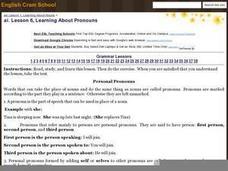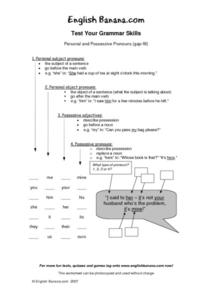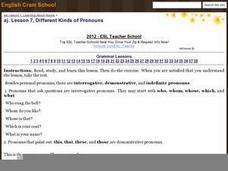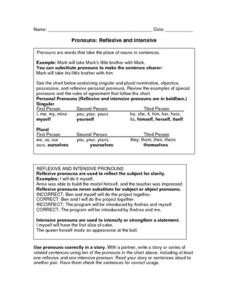Nosapo
Pronouns: Personal Pronouns, Demonstrative Pronouns
Which do you use: that or this? Which or where? Me or I? Practice pronoun use with a series of activities that focus on personal and demonstrative pronouns.
Curated OER
Reference Packet: Pronouns
Pronouns, pronouns, pronouns! Review all of the different types of pronouns, and complete several practice opportunities. Read through the information with your class before sending them off to work on the packet independently.
Curated OER
Direct, Indirect, and Reflexive Pronouns
Provided here is a thorough review of direct, indirect, and reflexive pronouns. First learners study the chart for direct object pronouns, reading through the Spanish and English equivalencies. Then, they read the bulleted information...
Curated OER
Personal And Possessive Pronouns: Reference Page
This handout provides a description and examples of subject, personal, and possessive pronouns, as well as possessive adjectives. It would be a nice reference sheet, but includes no exercises.
Curated OER
Not So Personal Pronouns
There are six types of pronouns to explore! Put on your thinking hat and read about each type: demonstrative, indefinite, intensive, interrogative, and reflexive. This worksheet comes with two pages of explanations and examples, and it...
Curated OER
Reflexive Pronouns
What a great review of reflexive pronouns! Grammarians of all ages will benefit from this packet. The first page gives descriptions and examples of different reflexive pronouns and common mistakes. The second page holds two, short...
Nosapo
Family Titles, Pronouns, Writing about a Person
How is your grandmother related to you? How is your cousin related to your grandmother? Learn about family relationships and pronouns with an activity that guides pupils to write two short narratives about members of their families.
Curated OER
Subject Object Pronoun Practice
Practice substituting subjects and objects in a sentence with the correct pronouns. A grammar worksheet prompts young learners to fill in the blanks for ten missing subjects, and then ten missing objects in different sentences.
K12 Reader
Special Singular Pronouns
As everybody knows, pronouns must match their antecedents. Except for those special ones like everybody, neither, one and several others. These exceptions are the focus of a short instructional activity that first models the...
LearnEnglishFeelGood.com
Personal Pronouns
Use this grammar worksheet to accompany your instruction or test your learners' knowledge by inviting them to read senetnces, fill in the blanks, and prove their personal pronoun proficiency.
LearnEnglishFeelGood.com
Reflexive Pronouns
Use this 10-question grammar instructional activity to assess, practice, or review reflexive pronouns where learners will read sentences and fill in the blank with the corresponding reflexive pronoun.
Curated OER
Direct and Indirect Object Pronouns
After mastering direct and indirect pronouns, learn the correct sentence structure for having both in the same sentence. This resource provides explanations and clear examples. Consider printing this reference guide on a colored piece of...
Curated OER
Learning About Pronouns
Present personal pronouns with this resource. This worksheet starts out with information about and examples of pronouns and personal pronouns. Learners review key teaching points about personal pronouns and then take a test. The first...
English Banana
Test Your Grammar Skills: Personal and Possessive Pronouns (gap-fill)
Practice personal and possessive pronouns by filling in the blanks. Learners are given information about different types of pronouns and can use that information to fill out the worksheet. Arrows help to clarify what information applies...
Curated OER
Pronouns: Interrogative, Demonstrative, Indefinite
English language pronouns pose special usage challenges. The second session about them on EnglishCramSchool.com addresses interrogative, demonstrative, and indefinite pronouns. Aspiring grammarians review rules and information,...
Curated OER
Personal and Possessive Pronouns
You said what to whom? Pupils have 14 opportunities to practice personal object, personal subject, possessive adjectives, and possessive pronouns. What fun!
Curated OER
Pronouns and Possessive Adjectives
In this pronouns and possessive adjectives worksheet, students identify usage in sentences. In this short answer worksheet, students write sixteen answers.
Curated OER
Pronouns: Reflexive and Intensive
What is the difference between reflexive and intensive pronouns? To find out, review the definitions and examples for various types of pronouns. Then complete several activities that help the class learn to recognize and use pronouns....
Curated OER
What's the Case? - The Three Cases of a Personal Pronoun
In this grammar worksheet, students learn about personal pronouns (subject, object and possessive) in sentence writing. They then answer the 14 questions on the worksheet. The answers are on the last page of the packet.
K12 Reader
Personal Pronouns
Practice personal pronouns with a special focus on subject and object pronouns. Learners read 20 sentences and circle the subject or object pronoun in each. They note which is present with an S or an O.
Curated OER
Using Intensive Pronouns
Myself, yourself, and himself are intensive pronouns. Get your learners using these pronouns when writing sentences with this series of worksheets which include a reading and discussion section, examples, three practice activities, and...
Curated OER
Who? What? Why? - Using Interrogative Pronouns
Interrogative pronouns are an important part of learning the interrogative sentence form. Middle schoolers learn about using interrogative pronouns in sentence writing, and use what they read to answer the nineteen questions on the...
Curated OER
Relative Pronouns--Omission
In this grammar instructional activity, students choose whether to omit or keep the relative pronoun in ten sentences. Students check their answers when completed.
Curated OER
Relative Pronouns
What does a relative pronoun have to agree with in a sentence? If you said the its antecedent, you're right! Read the short explanation and study the examples at the top of the page. Then, decide which verb form matches the relative...
Other popular searches
- Personal Pronouns
- French Personal Pronouns
- Compound Personal Pronouns
- Personal Possessive Pronouns
- Esl Personal Pronouns
- Personal Pronouns Spanish
- English Personal Pronouns
- Object Personal Pronouns
- E.s.l. Personal Pronouns
- Personal Pronouns "Pronouns"
- Personal Pronouns Pronouns
- Personal Pronouns 1























